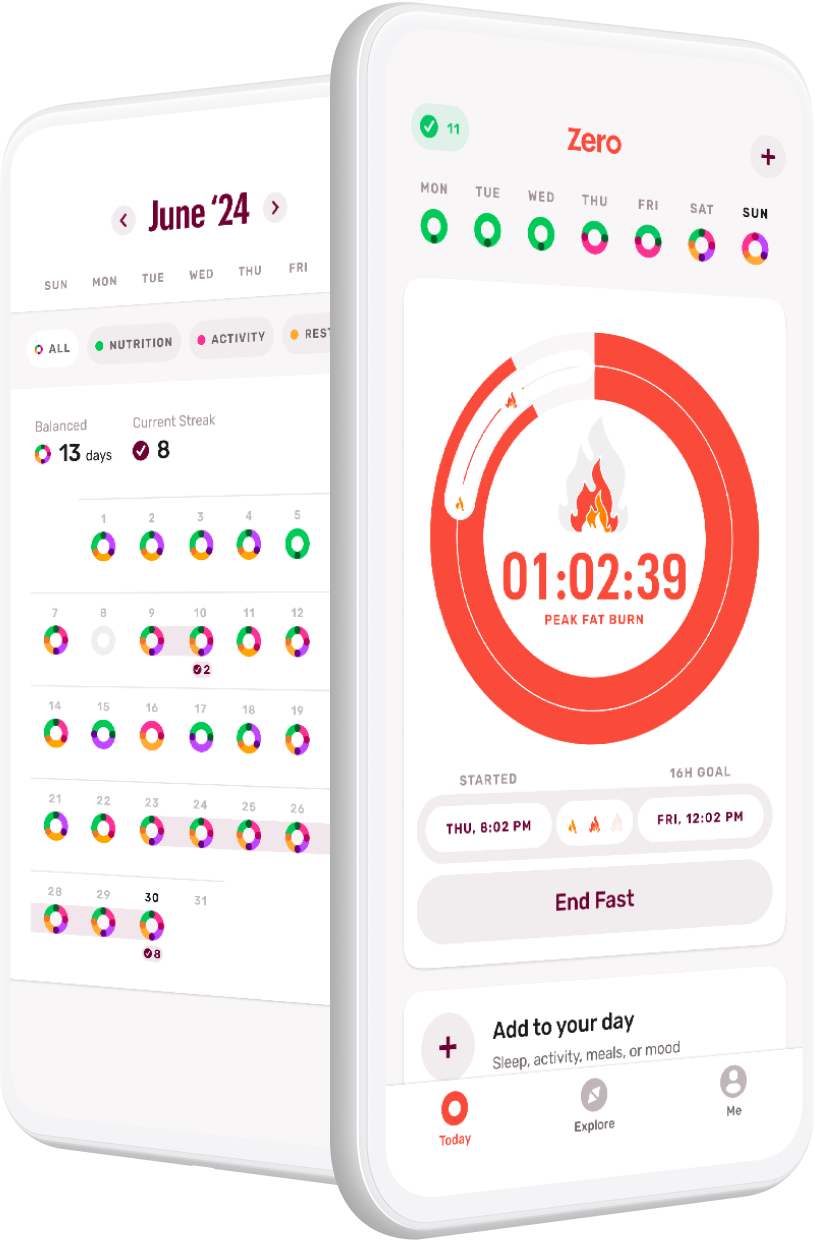Written and medically reviewed by Rich LaFountain, PhD
Whether you’re trying to build muscle, lose weight, live longer, or some combination of these goals, you need to be eating protein — and if you’re like 40% of adults in America, you’re probably not getting enough.
Protein is hugely important to your entire body. In fact, the only thing your body contains in larger quantities than protein is water! The majority of this protein is, unsurprisingly, found in your muscles; however, there’s a considerable amount of protein in your nails, hair, teeth, and bones, as well.
As you’ll see, protein is not only important for overall health, but also for achieving your weight-loss and longevity goals. Read on to better understand what protein is, why you need it, how much to consume, and how prioritizing protein in your diet will help you stay metabolically healthy, minimize disease risk, and enhance your quality of life.
Why Is Eating Protein Important?
Dietary protein — which can be found in nearly every food but is most plentiful in foods like meat, eggs, and dairy — is essential for building every structure in your body, including (but not limited to!) healthy, metabolically active muscle. Unlike fat and carbohydrates, protein is not stored in your body; there’s no onboard reserve to tap into when your supplies are low. Therefore, if you don’t consume enough protein for your needs, your body is forced to choose between healthy cellular function or maintaining your hard-earned muscle mass. In these situations, your body will most often prioritize the immediate needs of your cells and break down your muscle to get the protein it needs.
Breaking down muscle is bad news, and not only because you need your muscles to move through the world. Healthy working muscle is metabolically protective and regulates your blood-glucose levels, helping to prevent glucose spikes and burning up to 75% of the glucose you eat. Therefore, it’s no surprise that reductions in muscle mass are shown to precede metabolic health decline, disability, and disease. Furthermore, healthy muscle may also help to regulate your immune system, providing protection against chronic or infectious disease. Muscle keeps you healthy in more ways than one, so you need to make sure you’re supplying it with the protein it needs!
How Much Protein Should You Get Daily?
The National Institutes of Health Food and Nutrition Board recommends that adults consume 0.83 grams of protein per kilogram of body weight (g/kg), or 0.37 grams per pound (g/lb), each day. This Recommended Dietary Allowance (RDA) is sufficient to meet basic living requirements in 97–98% of people, but if you want to build and maintain healthy, strong muscles, it’s wise to aim higher than the RDA — especially since up to 40% of adults fall short of that baseline.
If your BMI is greater than 30 kg/m2 and you are not a competitive athlete or bodybuilder, a good daily protein intake target is 1.2–1.6 g/kg. Alternatively, if your BMI is under that threshold and you are over 50 years old, exercising regularly, and/or trying to lose weight, you may want to aim for slightly more than double the RDA in order to best support your muscle mass. Targeting a daily protein intake of 2.2 g/kg or 1 g/lb of body weight makes the math easy and gives you a buffer for days you inevitably undershoot your target. Just make sure that you consult a dietitian or physician before substantially increasing your daily protein intake, particularly if you have reduced kidney function.
What Are the Different Types of Protein?
Proteins are made of building blocks called amino acids. There are 20 amino acids in total, 11 of which your body can synthesize itself (nonessential) and 9 of which it cannot (essential). Because your body can’t produce essential amino acids, you must eat them in order to maintain healthy levels for proper cell, tissue, and organ function. Leucine, for example (found in salmon, eggs, nuts, and beef), is an essential amino acid that is heavily involved in building muscle — making it even more important to consume as you age and naturally lose muscle.
If you’re eating animal protein (be it meat, fish, dairy, or eggs), you’re getting all nine essential amino acids, which is why animal proteins are considered “complete” proteins. Whole-food, plant-based proteins often are low in or lack certain essential amino acids, so they are considered “incomplete.”
In addition to whole-food protein options, supplementary protein can be found in a variety of forms, from powders to bars to pre-packaged shakes. Whey protein, made from milk byproducts, is one of the most popular supplemental proteins, and supplemental plant proteins like pea protein are often fortified so they contain all the essential amino acids.
Does Your Diet Type Affect Your Protein Intake?
Your dietary preferences or restrictions do affect your protein intake, but not necessarily in the ways you might think. It was once believed that if you were a strict vegetarian or vegan, you had to be selective about which foods you paired to create a meal that contains a complementary amino-acid profile. However, recent research indicates that as long as your diet is at least slightly varied, you do not need to be nitpicky about mixing plant foods with complementary amino-acid profiles at every meal.
Vegetarians and vegans do, however, need to consider the digestibility of their protein sources. Protein digestibility is heavily influenced by the fiber content of the food you’re eating. There’s nothing wrong with fiber — in fact, fiber improves glucose control, increases satiety, and reduces your risk of many types of cancer. However, it can also hinder your body’s ability to extract protein from your food. Highly digestible proteins come in whole foods that contain very little fiber, such as eggs and other whole-food animal products. Your body finds these types of protein easiest to break down and use. Less-digestible proteins are typically plant-based and become entangled in the food’s fibrous structures, so they can’t be used by your body to the same degree. Examples of less-digestible proteins are nuts, lentils, and whole wheat. (Of the many plant-based protein options, soy has the highest digestibility score, making tofu an excellent option for vegetarians and vegans!)
How Do You Eat All That Protein If You’re Fasting for Weight Loss?
If you have a weight-loss goal and a daily fasting practice, you might be wondering: How am I going to fit all that protein into my eating window? The answer is not to cut your protein intake; doing that would actually undercut your weight-loss intentions in several ways. First, a high protein intake supports the growth and maintenance of muscle, which burns more calories at rest than other tissue types, like fat. Therefore, you want to keep eating protein in order to build and maintain all that calorie-burning muscle! Second, your body requires three times more calories to digest the protein you eat than it does fat or carbohydrates — meaning that emphasizing protein in your diet also helps burn calories. Finally, studies demonstrate that protein is the most satiating macronutrient, so it will keep you feeling fuller throughout the day, ultimately helping you maintain weight loss over time.
Protein-rich meals and snacks are usually enough to meet your daily needs, but protein shakes can also help you hit your intake goal while still allowing you to retain the benefits of an intermittent-fasting practice. However, if you’re having trouble fitting it all within your eating window, you may want to temporarily lengthen it until your weight — and, therefore, proportional protein needs — decreases.
For example, if you weigh 200 lbs and follow a 16:8 fasting schedule daily, it can be challenging to consume 200 g of protein within your 8-hour eating window, especially because research suggests that your body may only be able to digest and use a certain amount of protein per meal. Therefore, you’ll want to divide that 200 g protein target into 4–5 servings of 40–50 g each, scattered throughout your eating window. In this scenario, you can either eat every 2 hours, or slightly expand your eating window for the time being.
3 Tips for Optimizing Your Protein Intake
Whatever eating window you’re maintaining, here are three tips for fitting ample protein into your diet and making the most out of it.
Tip #1: Include At Least 20–40 Grams of Protein with Each Meal or Snack
Every meal and snack is an opportunity to stimulate muscle-protein synthesis (muscle building). You should be consuming protein at every meal (ideally 20–40 g), but your first meal of the day (a.k.a. your Fast Breaker) is especially important — aim to get 30 g of protein or more. Hitting this threshold after hours of fasting lets your body know that you have sufficient nutrition on board to not only meet your basic biological needs but also engage in building muscle.
Easy options that contain 30 g of protein include:
- 1 cup Greek yogurt + 1/4 cup walnuts
- 2 eggs + 5 egg whites
- 4 oz chicken breast
Tip #2: Eat Your Protein First
Research suggests that if you eat your protein before your carbs, you can reduce blood-glucose spikes by 50%. Not only will this help keep your energy levels more stable throughout the day, but it will also help reduce cravings. (And without cravings pushing you towards a sugar-loaded food for your next meal, you can choose a smarter, protein-rich option instead!)
Tip #3: Make Protein Convenient
If you make high-quality, protein-rich foods more readily available, you’ll have a much easier time incorporating them into your diet. Place options like nuts, hard-boiled eggs, canned fish, and tuna pouches in visible and easily-accessible places in your kitchen and pantry for healthy, productive snacking and meal prepping.
Conclusion
If you value your health and longevity, you need to make protein a priority. It may require a dietary shift, or even a shift in your fasting schedule, but the benefits are plentiful. By getting enough protein, you will feel more satiated, maintain lean muscle mass, improve your metabolic health, and prevent age-related health declines in your quality and length of life.
- Debunking 3 Myths Around Fasting and Thyroid Health - April 15, 2024
- Breaking Down Fast Breakers: How to Tell If Something Will Break Your Fast - March 4, 2024
- GLP-1s and Weight-Loss Medications vs. Lifestyle Interventions: What’s Right for You - February 5, 2024


